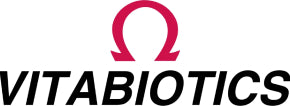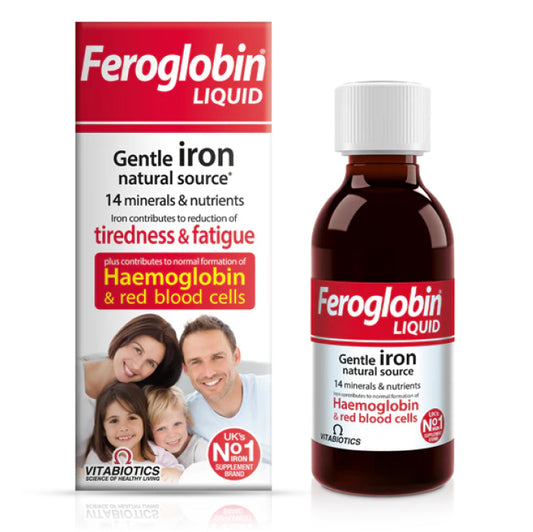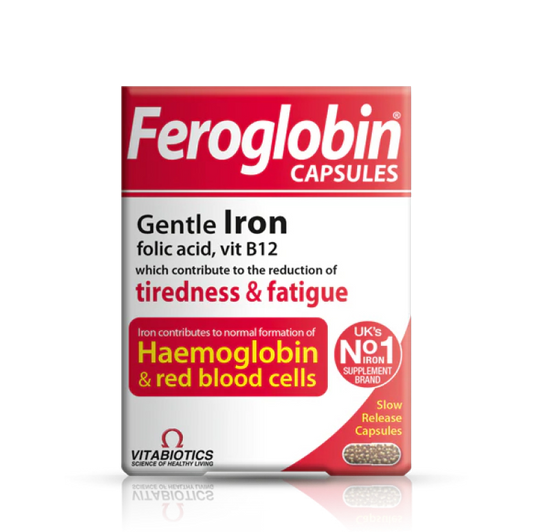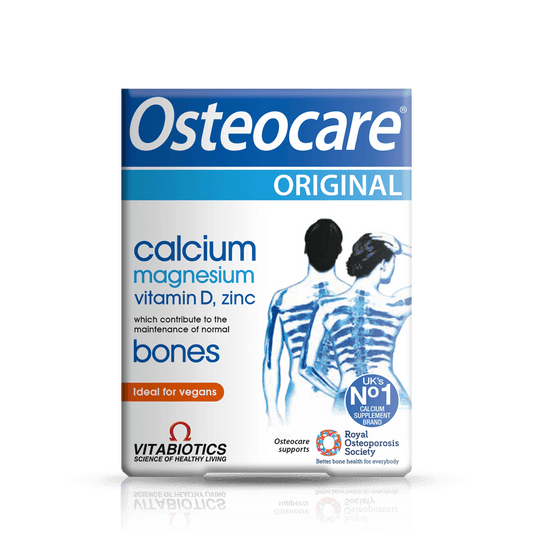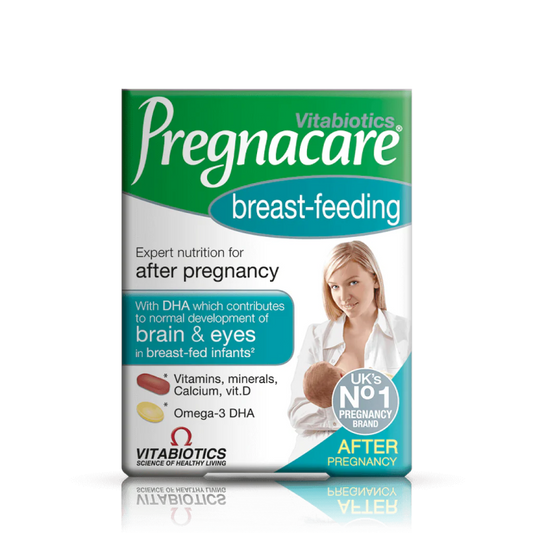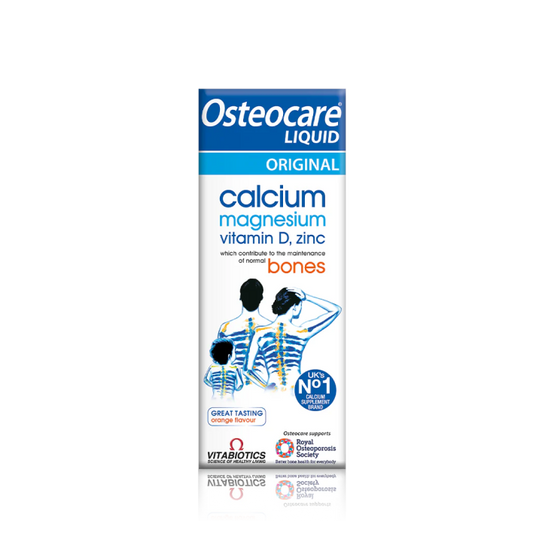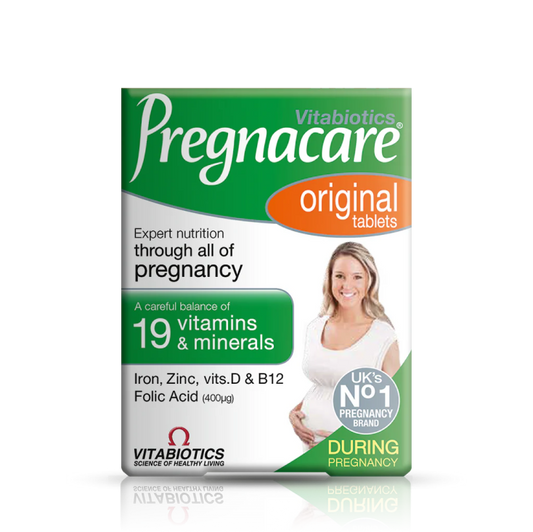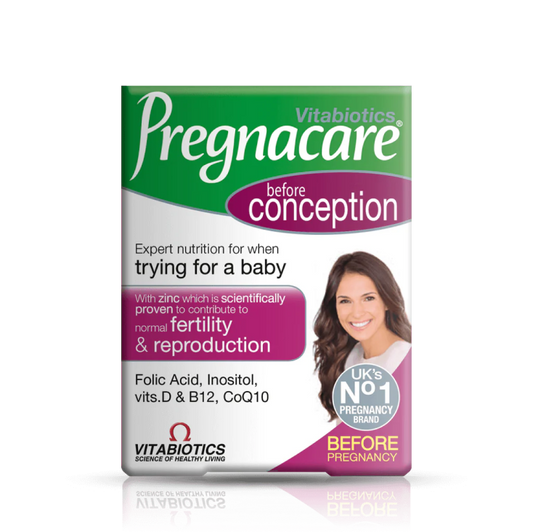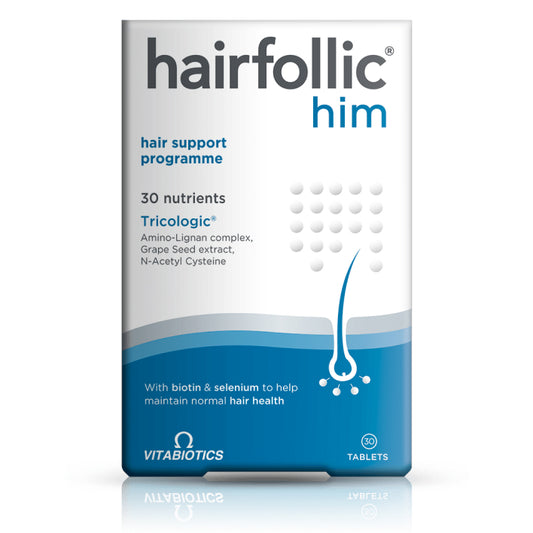Breastfeeding is a special stage in a woman's life - full of closeness, but also challenges. The mother's body works at full speed to provide the baby with everything that is best. During this time, the demand for certain vitamins and minerals increases significantly. Their deficiency can negatively affect both the mother's well-being and the child's development . Therefore, vitamins for breastfeeding women are not just an addition - they are the foundation of health and balance in this demanding period.
During lactation, a woman's body becomes a center for the distribution of nutrients. What is in the mother's diet has a direct impact on the quality of the milk, and therefore on the child's health. Providing the right amounts of key vitamins is therefore extremely important . The most important include:
- Vitamin D – supports the skeletal and immune systems, protecting against osteoporosis and infections.
- Vitamin B12 – essential for the proper functioning of the nervous system, affects concentration and energy levels.
- Folic acid – supports mental and physical condition, as well as the body's regenerative processes.
Deficiencies of these nutrients can lead to serious consequences . For example, a lack of vitamin D can result in weakened bones in the mother and developmental disorders in the child. And this is just one possible scenario.
What about diet? Is healthy eating enough to cover all the needs of the body? Theoretically, yes. In practice, it varies . Fatigue, lack of time, stress, and sometimes simply a lack of appetite - all of these can make it difficult to provide the body with the necessary nutrients.
In such situations, supplementation comes to the rescue. It is best if it is well thought out and consulted with a doctor or dietician. It is not a luxury, but a sensible decision and investment in the health of both the mother and the child. It brings benefits not only here and now, but also in the long term.
Why is supplementation during lactation so important?
Lactation is an intensive test for a woman's body . The body works at full speed - not only for itself, but above all for the child. That is why supplementation during this period takes on special importance . When the daily diet does not keep up with the growing demand for nutrients, reaching for appropriate preparations becomes not a choice, but a necessity.
Vitamin and mineral deficiencies can quickly make themselves felt. Symptoms such as fatigue, weakness, hair loss or reduced immunity are common and unpleasant . Supplements during breastfeeding help to replenish these deficiencies and support the body, which uses more energy and needs larger doses of nutrients - often difficult to provide through diet alone.
See also: Spring Equinox and Supplementation
The most frequently recommended vitamins and microelements during lactation include:
- Vitamins A, D, E and C – support immunity and regeneration of the body,
- B vitamins (B1, B2, B6, B12) – affect the nervous system and metabolism,
- Biotin and choline – support brain and skin function,
- Folic acid – crucial for the development of a child's nervous system.
Proper supplementation is an investment in the health of the whole family . It supports the health of the mother and is crucial for the proper development of the child - especially its nervous, immune and skeletal systems.
The impact of breastfeeding on nutrient requirements
Breastfeeding significantly increases the need for nutrients . A woman's body must now take care of the needs of two people. Although a balanced diet is essential, it is not always sufficient. In such situations, supplements are a valuable addition - not a replacement - to the daily diet.
Particularly important at this time are:
- Iodine – supports the proper functioning of the thyroid gland,
- Folic acid – essential for the development of a child's nervous system,
- Iron – protects against anemia and fatigue,
- Omega-3 fatty acids (DHA) – support the development of the child's brain and eyesight.
An example would be vitamin D, the demand for which during lactation may increase to as much as 2000 IU per day. Since it is difficult to obtain from diet or sun exposure, supplementation becomes essential.
A balanced diet, supported by appropriate preparations, is a solid foundation of health – for both mother and child.
The Role of Vitamins in Maternal Health and Child Development
Vitamins are invaluable support during lactation. They support the child's development and help the mother maintain good physical and mental condition. A woman's body works at its highest speed, which is why it needs solid support in the form of properly selected nutrients.
Supplements for breastfeeding women should include:
- Iodine – for proper thyroid function,
- Folic acid – supports the development of the child's nervous system,
- DHA (omega-3) – essential for brain and vision development,
- Vitamin D – strengthens immunity and bones,
- Iron – prevents anemia and fatigue.
Each of these components has a specific function:
- Folic acid – supports the development of the nervous system,
- DHA – supports brain and vision development,
- Iron – improves oxygenation of the body and prevents weakness.
Supplementation is not just about supplementing your diet – it is about consciously taking care of yourself and your child . It is also a way to maintain peace of mind and ensure that your body is getting everything it needs.
The most common deficiencies in breastfeeding women
During breastfeeding, a woman's body may have difficulty maintaining the appropriate level of certain components. The most common deficiencies include:
- Iodine – affects the metabolism and development of the child,
- Folic acid – crucial for the nervous system,
- Iron – its deficiency can lead to anemia,
- Vitamin D – essential for healthy bones and immunity.
Deficiencies of these nutrients can lead to:
- fatigue and weakness of the body,
- decreased immunity,
- problems with concentration,
- anemia and weakening of bones and teeth – in both the mother and the child.
Well-chosen supplementation can effectively prevent these problems . Preparations created for breastfeeding women contain ingredients in the right proportions, which makes them safe and effective support.
Regularly checking your vitamin and mineral levels and consulting a doctor or dietitian is the best way to take care of your health during this beautiful, yet demanding time.
The most important vitamins and minerals for breastfeeding women
During breastfeeding, a woman's body works intensively, which is why it needs increased support in the form of key nutrients . Vitamins and minerals such as vitamin D, iodine, folic acid, iron and omega-3 acids play an important role both for the health of the mother and the proper development of the child.
Individually selected supplementation can effectively replenish any deficiencies and support the body during this demanding time.
Vitamin D – immunity and healthy bones
Vitamin D3 is not only a building block for strong bones, but also a key element supporting immunity. During lactation, the need for it increases because it affects:
- better calcium absorption , which translates into bone health for the mother and child,
- strengthening the immune system , reducing the risk of infection,
- maintaining proper levels of vitamin D , which is important for overall well-being.
Regular supplementation may be necessary, especially during the fall and winter.
Folic acid and folates - development of the child's nervous system
Folic acid and its natural forms – folates – are essential for:
- proper development of the infant's nervous system,
- cell division processes and DNA synthesis,
- maintaining the proper level of homocysteine, which supports the heart and blood vessels.
Folic acid deficiency can lead to serious health consequences , so it is worth taking care of its daily supply – preferably in a methylated form, easily absorbed by the body.
Iodine – proper thyroid function and brain development
Iodine is an element essential for:
- proper functioning of the thyroid gland , which regulates metabolism and energy levels,
- development of the child's brain and nervous system ,
- maintaining concentration and cognitive abilities in the future .
It is worth choosing iodine supplements in an organic form that is easily absorbed by the body.
Iron – preventing anemia and fatigue
Iron plays a key role in red blood cell production. Its deficiency can lead to:
- anemia,
- chronic fatigue and weakness,
- decrease in concentration and immunity.
During lactation, especially after childbirth with significant blood loss, the demand for iron increases . Supplementation in combination with vitamin C increases its absorption and effectiveness.
See also: How to supplement iron as a woman?
Omega-3 fatty acids (DHA and EPA) – development of the child's brain and vision
Omega-3 fatty acids, especially DHA and EPA, are essential for:
- the development of the child's brain and vision,
- maintaining the quality of mother's milk,
- mental support for the mother – may reduce the risk of postnatal depression.
This ingredient works in two ways – it supports the health of both mother and child. It is worth choosing supplements from certified sources, free from contamination.
Choline – support for the nervous system and metabolism
Choline is an ingredient that is gaining increasing recognition among specialists. Its effects include:
- supporting child brain development,
- we participate in metabolic processes,
- production of neurotransmitters that affect memory and concentration,
- synergistic effect with folic acid – together they support the nervous system.
It is worth ensuring its presence in your diet or supplementation, especially in the first months after giving birth.
Vitamin B12 – nervous system and blood cell production
Vitamin B12 performs many important functions:
- supports the nervous system and cognitive functions,
- participates in the production of red blood cells,
- helps in DNA synthesis,
- supports homocysteine metabolism (in combination with folic acid).
If you follow a plant-based diet, pay special attention to supplementing B12 , as it is mainly found in animal products.
Vitamin B6 – Hormonal Balance and Nervous Functions
Vitamin B6 is a versatile ingredient that:
- supports the nervous system and cognitive functions,
- regulates hormonal balance,
- helps maintain emotional balance,
- may prevent baby blues by supporting serotonin production.
Its presence in the diet is an investment in the well-being and emotional stability of the young mother.
Vitamin C - immunity and better iron absorption
Vitamin C is not only a classic among antioxidants, but also:
- strengthens immunity and protects against infections,
- increases the absorption of iron from food and supplements,
- accelerates wound healing,
- reduces oxidative stress that often accompanies young mothers.
Getting enough vitamin C every day – both from your diet and supplements – is a simple way to support your body during lactation .
Additional ingredients to support the health of a breastfeeding mother
Breastfeeding is a time of intense changes in a woman's body - not only hormonal. It is a real revolution that requires special care for health. In addition to basic vitamins and minerals, it is worth considering including additional nutrients in the diet. They can realistically:
- Strengthen your immunity
- Improve the appearance of skin, hair and nails
- Influence the quality and quantity of food
Their presence in the daily diet or supplementation is an investment in the health of the mother and the well-being of the child . Because a healthy mother means a calmer, happier baby.
Selenium, zinc and lactoferrin – immunity and thyroid function
Selenium, zinc and lactoferrin form a strong alliance supporting a woman's body after childbirth:
- Selenium – essential in microscopic amounts, plays a key role in thyroid hormone production. Its importance increases during lactation, when metabolism accelerates.
- Zinc – supports immunity, skin regeneration and strengthens hair and nails. This is especially important during the period when the body is getting back into shape after pregnancy.
- Lactoferrin – naturally present in breast milk, supports intestinal microflora and has antibacterial properties, which translates into better immunity for mother and child.
Calcium and magnesium - healthy bones and muscles
Calcium and magnesium are a duo that takes care of the foundations of a breastfeeding woman's health:
- Calcium – is responsible for strong bones and teeth. During breastfeeding, its reserves are intensively used for milk production, which is why it is so important to supplement them.
- Magnesium – supports the nervous and muscular systems. Its deficiency can manifest itself through cramps, fatigue and irritability.
For better calcium absorption, vitamin D is essential . Together, they form a harmonious team that works on many levels of health.
Biotin – the condition of hair, skin and nails
Biotin (vitamin B7) , known as the “beauty vitamin”, plays an important role in postpartum recovery. Many women notice:
- Hair loss
- Brittle nails
- Loss of skin luster
Biotin supports metabolic processes in skin cells and hair follicles, which can help restore their healthy appearance. Biotin supplementation is often the first step to regaining balance and feeling better in a new reality.
Beta-glucan and barley malt extract - lactation support
Beta-glucan and barley malt extract are natural ingredients that support lactation. Their effect is based on the influence on the level of prolactin - a hormone responsible for milk production:
- Beta-glucan – present in barley malt, among others, has an immunomodulatory effect, supporting immunity at key moments.
- Barley malt extract – traditionally used to support lactation, it can help maintain an appropriate level, especially in the first weeks after birth.
Including these ingredients in your diet can really support breastfeeding , especially in its initial, often demanding phase.
Vitamins A, E and B group - antioxidants, metabolism and skin
Vitamins A, E and B vitamins provide invaluable support for the body of a breastfeeding woman:
- Vitamin A – supports eyesight, immunity and tissue regeneration.
- Vitamin E – a strong antioxidant, protects cells from oxidative stress, which may increase after childbirth.
- B vitamins (B6, B12, folic acid) – support energy metabolism, the nervous system and blood-forming processes.
The right level of these vitamins affects not only physical health, but also mood . And the mother's well-being is essential in this exceptional, yet demanding time.
How to choose the right vitamin preparation?
Choosing the right vitamin supplement while breastfeeding is not only a matter of health, but also of everyday comfort. Why is it so important? Because it affects both your well-being and the proper development of your child. During this special period, a woman's body needs increased amounts of certain nutrients - such as vitamin D, iron or folic acid . Therefore, supplementation should be well thought out and adjusted to individual needs.
Wondering which vitamins are best? Don't just rely on the label. It's not just the composition that counts, but also the quality and form of the product. Capsules, tablets, liquids or powders - each form has its advantages. Choose the one that best suits your lifestyle. The most important thing is safety: the supplement should be tested, free from unnecessary additives and contain ingredients in the right proportions. Only then can you be sure that it supports the body and does not harm it.
This may be useful to you: Vitamins and supplements for pregnant women
What to consider when choosing a supplement?
When breastfeeding, it is worth choosing supplements consciously. A good preparation should contain ingredients developed specifically for breastfeeding mothers – those that support both you and your child. But that is not all.
Here's something else worth paying attention to:
- Quality of raw materials – choose products with confirmed origin of ingredients.
- Trust in the manufacturer – choose reputable brands that focus on transparency and safety.
- Comprehensive action – the supplement should support the body’s immunity, metabolism and regeneration.
- Consultation with a doctor or dietitian – before starting supplementation, consult a specialist to avoid excess of certain ingredients that may be harmful.
A conscious choice of supplement is an investment in your health and that of your child.
Safe Ingredients and Forms of Vitamins During Lactation
Safety is a priority – especially during breastfeeding. Therefore, reach for ingredients that are safe for breastfeeding mothers, do not pass into milk in harmful amounts and are well tolerated by the body. Choose preparations with quality certificates that have undergone appropriate tests. This gives peace of mind – both for you and your child.
The form of the supplement also matters. You can choose from:
- Capsules – easy to swallow, often tasteless,
- Tablets – convenient to dose,
- Fluids – they are absorbed faster, good for people with swallowing difficulties,
- Powders – can be easily added to meals or drinks.
It is important that the product does not contain artificial colors, preservatives or unnecessary additives. During lactation, it is especially worth paying attention to the following ingredients:
|
Component |
Function |
|
Vitamin D |
Supports immunity and bone health |
|
Folic acid |
Helps in the regeneration and production of new cells |
|
Iron |
Essential for energy and proper functioning of the body |
In short: choose consciously, focus on quality and safety. Your body – and your child – will surely appreciate it.
Differences between preparations for pregnant and breastfeeding women
At first glance, it may seem that vitamins for pregnant women and for breastfeeding mothers are the same. However, this is a false impression. They differ in both composition and purpose .
Here are the key differences:
|
Preparations for pregnant women |
Preparations for breastfeeding mothers |
|
Focused on supporting fetal development |
Focused on the regeneration of the body after childbirth and support of lactation |
|
They contain more folic acid and DHA |
They contain ingredients that support immunity, energy and milk quality. |
|
Adapted to the needs of the first months of pregnancy |
Adapted to the needs of the body during lactation |
Being aware of these differences allows you to better match your supplementation to your body's current needs . And that means one thing - better well-being for you and healthy development for your baby.
See also: What are the best supplements for women?
Supplementation and the diet of a breastfeeding woman
Breastfeeding is a special time – for both the mother and the child . During this period, a woman's body has an increased need for nutrients. Therefore, daily meals should not only be filling and tasty, but above all rich in vitamins and minerals. However, even the best balanced diet does not always cover all the needs of the body. In such cases , supplementation can be a valuable support – although it does not replace a healthy diet . Properly selected preparations help improve well-being and health, which is especially important when the nights are short and the days are full of challenges.
Is Diet Enough? When Should You Take Supplements?
Many mothers wonder: "Is what I eat enough to take care of myself and my baby?" The answer is not clear. Supplements are not mandatory for every breastfeeding woman, but in many cases they prove invaluable.
The most common deficiencies during lactation are:
- Vitamin D – supports immunity and bone health,
- Iron – prevents anemia and fatigue,
- Omega-3 fatty acids – support the development of the child's brain and nervous system.
Deficiencies in these nutrients can negatively impact both the mother's health and the child's development. Therefore, it is worth consulting a doctor or dietitian to select appropriate preparations and prevent deficiencies before they occur.
Products rich in key vitamins and minerals
The basis of healthy nutrition during lactation is natural, unprocessed products. In your daily diet, it is worth including:
- Oily sea fish (salmon, mackerel, sardines) – a source of omega-3 fatty acids,
- Dairy products (kefir, natural yogurt, cottage cheese) – rich in calcium,
- Green leafy vegetables (spinach, arugula, kale) – provide iron and folic acid,
- Berries (strawberries, blueberries, raspberries) – full of vitamin C and antioxidants,
- Nuts and seeds (almonds, linseeds, pumpkin seeds) – a source of healthy fats and fiber.
Diversity is the key to success – the more colourful and varied the plate, the better for the health of the mother and child. Vegetables and fruits provide vitamins and support immunity, and healthy fats and protein are essential for regeneration and milk production.
Sample lactation support menu
What can a menu that supports lactation and tastes good look like? Here is a sample menu for the whole day:
|
Meal |
Proposal |
Benefits |
|
Breakfast |
Oatmeal with plant milk, nuts and fresh fruit |
Provides fiber, vitamins and healthy fats |
|
Lunch |
Baked cod with millet and boiled broccoli |
A source of protein, iodine, vitamin C and iron |
|
Dinner |
Avocado, Egg and Pumpkin Seed Salad |
Rich in healthy fats, protein and zinc |
This diet provides everything you need: vitamins, minerals, fiber, protein and healthy fats. What's more - it supports milk production, which directly affects your child's development. Tasty, healthy and with care for both of you. Good nutrition is an investment in your common future.
Vitamin and mineral preparations for breastfeeding women
Choosing the right supplements for breastfeeding mothers is not just a matter of health – it is an investment in the well-being of both the woman and her child. During lactation, the body works at its highest speed, which is why it is worth reaching for comprehensive vitamin and mineral preparations that meet the increased demand for nutrients.
Vitamins for breastfeeding women have been developed to support the body during this demanding time. Among the most important ingredients to consider are:
- Vitamin D – strengthens immunity and supports bone health,
- Folic acid – essential for regeneration and creation of new cells,
- Iron – helps maintain energy and prevents anemia,
- Omega-3 fatty acids – support the development of the baby's nervous system and improve the mother's mood.
Supplements for breastfeeding women should be selected individually – preferably after consulting a doctor or dietician. For example? If you struggle with iron deficiency, you need a product with a higher iron content. Simple? Maybe so, but effective.
Multivitamin capsules are a convenient solution – one a day, and the body gets a solid portion of support . But are vitamins and minerals alone enough? Well – what else can help in this intensive period after childbirth?
Postpartum Hair Supplements – What’s Worth Knowing?
Hair loss after childbirth? Sound familiar? Don't worry - it's a common problem that affects many new mothers. The culprit is hormonal changes , which can really mess things up. The good news? There's a solution. Hair loss after childbirth can be strengthened from the inside - with carefully selected supplements.
What should you pay attention to when choosing products that support hair condition?
- Biotin (vitamin B7) – supports the condition of hair, skin and nails,
- Zinc – strengthens hair structure and accelerates regeneration,
- Selenium – protects cells from oxidative stress and supports hair growth.
Don't be fooled by advertisements . Before you reach for a specific product, check the opinions of other mothers, talk to a doctor or dietician. Or maybe it's worth reaching for natural methods? Herbal rinses, scalp massage - sometimes they make the difference. Who knows, maybe this will be your way to beautiful, strong hair?
Prenatal vitamins and the needs of breastfeeding women
Many women continue taking prenatal vitamins after giving birth. But is that the best choice? Not necessarily. These supplements were created with pregnancy in mind—their primary goal is to support fetal development. After giving birth, a woman’s body has completely different needs: regeneration, milk production, immune boosting … and more.
Therefore, vitamins for breastfeeding women should contain ingredients adapted to the new reality, such as:
- Increased dose of vitamin D – for strong bones and immunity,
- Folic acid – supports the nervous system and regenerative processes,
- Iron – prevents fatigue and supports the production of red blood cells,
- Other ingredients to improve well-being and energy levels.
It is not only a matter of the mother's health - it is also the quality of the milk, and therefore the child's development . That is why it is worth choosing supplements consciously, guided by the real needs of the body after childbirth.
The differences between prenatal vitamins and those designed for breastfeeding mothers are significant – both in terms of composition and action. Understanding these differences is the first step to effective supplementation.
What else is worth considering? Lifestyle, diet, stress level – all of these affect what your body really needs. So before you reach for the first product on the pharmacy shelf, stop for a moment and think about what will be best for you.
Frequently asked questions about supplementation during lactation
Breastfeeding is a special time – full of emotions, but also many doubts. Many mothers wonder whether dietary supplements are necessary at all. And if so, which supplements are worth taking, for how long, and can they affect breast milk? Can you overdo it with vitamins? There are many questions, and the answers are not always clear.
To dispel these doubts, it is worth understanding how supplementation works during lactation . A conscious approach allows you to take care of your health – yours and your baby’s – without unnecessary stress and risk.
Can you overdose on vitamins while breastfeeding?
Yes, vitamin overdose is possible – and unfortunately, it happens more often than you might think. Fat-soluble vitamins are particularly dangerous, such as:
- Vitamin A – too much of it can lead to headaches, chronic fatigue and even developmental disorders in infants.
- Vitamin D – in excess may cause hypercalcemia and kidney problems.
- Vitamin E – too high doses may affect blood clotting.
- Vitamin K – although less commonly overdosed, also requires caution.
It is not worth doing it on your own . Before you reach for any supplement, consult a doctor or dietician. Safe supplementation is one that is tailored to your individual needs - not random or based on recommendations from the Internet.
How long to take supplements after giving birth?
There is no one-size-fits-all answer . The duration of supplementation depends on many factors, such as:
- The woman's health condition after childbirth – e.g. blood loss, weakening of the body.
- Lifestyle and diet – are you getting enough nutrients from the food you eat?
- The course of childbirth – natural childbirth vs. cesarean section, possible complications.
- Presence of deficiencies – confirmed by blood tests.
What to do? Monitor your body, get regular checkups, and talk to your doctor. Supplementation is not a sprint, it's a marathon . Give yourself time to regenerate, and remember, self-care is not a luxury, it's a necessity.
Do supplements affect the quality of breast milk?
Yes – supplements can have a real impact on the composition and quality of breast milk, which is important for the child’s development. For example:
- Omega-3 fatty acids (DHA) – support the development of the infant's brain and nervous system.
- Vitamin D – supports the child's immune and skeletal systems.
- Iodine – essential for proper thyroid function and brain development.
However, not every supplement is beneficial. Too high doses, low quality products or improper composition can do more harm than good. Therefore:
- Choose supplements dedicated to breastfeeding women.
- Choose products recommended by specialists.
- Avoid preparations of unknown origin and without quality certificates.
Remember: what goes into your body also goes – albeit indirectly – to your child. That is why it is worth choosing wisely and responsibly.
Summary: How to take care of your health and that of your child through appropriate supplementation?
Breastfeeding is a unique challenge for a woman's body. Your body works hard to provide your baby with everything that is best. It is a time full of emotions, but also physical effort. That is why proper supplementation is not a luxury, but the foundation of health - both yours and your baby's.
Vitamins and minerals play a key role during this period. They not only supplement deficiencies, but also:
- strengthen immunity,
- they add energy,
- improve well-being ,
- help the body return to balance after childbirth .
This is especially important when the nights are short and the days are full of challenges.
What ingredients are worth paying special attention to? Here are the substances that are of great importance for the health of mother and child:
|
Component |
Role in the body |
|
Vitamin D |
Strengthens the immune system and bones |
|
Vitamin B12 |
Supports the nervous system and energy production |
|
Folic acid |
Responsible for proper cell division |
|
Iron |
Protects against anemia and fatigue |
|
Iodine |
Supports child's brain development |
Deficiencies in these nutrients can lead to serious consequences , from chronic fatigue to developmental disorders in infants. And every mother wants the best for her child, right?
When choosing supplements, don't just rely on the look of the packaging. Pay attention to:
- Composition – should be adapted to the needs of breastfeeding women,
- Quality – choose products tested and recommended by specialists,
- Effectiveness – confirmed by action, not just marketing promises.
The best solution is to consult a doctor or dietician. Only a specialist can choose a supplement that is ideally suited to your lifestyle and individual needs.
Because it's about more than just health - it's about the daily joy of being a mother, the strength to enjoy every moment with your child.
So... do you already know how you can take care of yourself?
